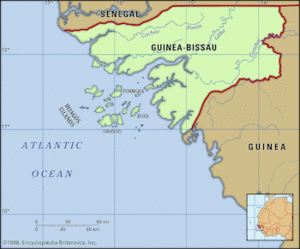
*On this date in 1973, Guinea-Bissau gained Independence from Portugal.
Self-governing occurred 89 years after the 1884 invasion from the Berlin Conference, the high point of white-European competition for territory in Africa, a process commonly known as the Scramble for Africa. Recognition became universal following April 24, 1974, a socialist-inspired military coup in Portugal overthrew Lisbon's Estado Novo regime. Luís Cabral was appointed the first President of Guinea-Bissau.
Following independence, the PAIGC killed thousands of local Guinean soldiers who had fought alongside the Portuguese Army against the guerrillas. Some escaped to settle in Portugal or other African nations. One of the massacres occurred in the town of Bissorã. In 1980, the PAIGC acknowledged in its newspaper Nó Pintcha (in November 1980) that many Guinean soldiers had been executed and buried in unmarked collective graves in the woods of Cumerá, Portogole, and Mansabá. The country was controlled by a revolutionary council until 1984.
The first multi-party elections were held in 1994. An army uprising in May 1998 led to the Guinea-Bissau Civil War and the president's ousting in June 1999. Elections were held again in 2000, and Kumba Ialá was elected president. In September 2003, a military coup was conducted. The military arrested Ialá for being "unable to solve the problems." After being delayed several times, legislative elections were held in March 2004. A mutiny of military factions in October 2004 resulted in the death of the head of the armed forces and caused widespread unrest. September 24th is now celebrated as the country's Independence Day, a public holiday.